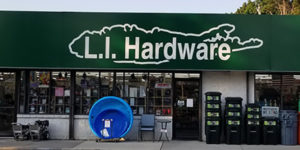Improve Retail Performance with New Profits from B2B
Published: August 15, 2017 Updated: August 26, 2021
Successful retailers are always looking for new markets for the products they sell. It’s not because of blind ambition or a desire for market domination. Growth is essential. The cost of running any business generally trends upward over time. A business with flat sales can only sustain itself for so long. That’s why growth is so important.
 How can you improve retail performance?
How can you improve retail performance?
If businesses aren’t selling directly to other businesses – B2B – they may be missing a huge opportunity to improve retail performance and expand their business. B2B customers are usually a reliable and consistent revenue source. As those relationships mature, the door is open to suggest many other products they might need and possibly tap into that customer’s network for added B2B business.
At first glance, Long Island Hardware looks like a quintessential independent neighborhood hardware store. While the business gets its share of DIY homeowners and building contractors, the single store makes most of its hay on over 500 commercial accounts.
In essence, it is a neighborhood hardware store. Being located smack dab in the middle of Long Island, though, means its neighborhood is filled with light industry, educational institutions, and commercial businesses of all sizes.
Where to begin B2B
Start by thinking differently about how you serve the customers you have. Instead of relying on them to come to you, start by paying your customers who own businesses a visit. This may be the easiest entry point to selling B2B. You probably know the owners or decision-makers in these organizations already.
You might be thinking, “Wait a minute. They’re already a customer. Why go to all this extra trouble?” Excellent question! Let’s say you’re a hardware store owner. You have a customer, a builder, who regularly purchases exterior grade plywood from you. That’s great, but where is this customer buying the studs, this plywood is being attached to?
What is it being fastened with? Screws? Nails? What about house wrap, felt, insulation, siding, windows, doors, molding, flooring, and all the other things a builder needs? Shouldn’t this builder be purchasing these items from you?
To improve retail performance, you need to figure out how to get this builder, and other B2B customers, to do more business with you. Does this customer prefer a fastener or other product you don’t stock? Do you need to adjust your prices or offer a discount to make buying from your business more attractive? Would free delivery add sufficient value to keep this customer coming back for more?
Reach out to your current customers. Ask questions and find out what you can do to make it easier for them to purchase a wider range of products from you. At the same time, demonstrate the additional value you and your business can deliver.
Modify your message
As you begin to reach out to your current customers, start thinking like a consultant.
Adopting a “customer first” mindset and looking out for the customer’s best interest positions you as more of an advisor and collaborator than a salesperson. They’ll be more comfortable doing business with you once they understand their success is your primary concern. Earning trust is very important.
Ask questions and listen carefully to the responses. When you fully understand the problems your B2B customers are trying to solve, you’ll be able to guide them to the best possible solution. Ideally, that solution is something you sell.
Even if you don’t sell the product they need, put the customer in touch with the person or company that does. You may not have made a sale in this case, but you have established yourself as a knowledgeable and helpful resource. If you’re taking the long view, this is a great position in which to be.
If you can help them solve one problem, they’re likely to call on you the next time they hit a wall. By acting as a partner, you’re creating future opportunities to improve retail performance through B2B sales.
Enlarge your orbit
Your opportunities to sell B2B go far beyond the customers you serve now. Here are some targets to set your sights on as you reach further into your community.
Local government
Consider how your business can serve the various agencies in your city, county, and state government.
For example, hardware stores can supply building materials, landscape maintenance tools, electrical supplies, cleaning products, paint, and other items to the various departments that keep public buildings and other public spaces safe, clean, and functioning properly. Workplace cleanliness has taken on a more significant role since the outbreak of the pandemic.
Long Island Hardware serves most of the municipal agencies in Suffolk County including Bohemia, Ronkonkoma, Holbrook, Oakdale, Sayville, West Sayville, East Islip, Central Islip, Islandia, Patchogue, Bayport and Blue Point.
Schools
Much like a local government, school systems have buildings and open spaces to maintain as well as ongoing improvement projects.
While bigger jobs may be turned over to contractors, many school systems need supplies to complete the projects they build themselves. Keeping schools clean and safe also creates a great opportunity to improve retail performance for the company that fills the continual need for cleaning products.
George Uribe, who has helped run Long Island Hardware since 1986, says his store supplies seven local school districts, local colleges and universities such as Dowling College, St. John’s University, St. Joseph’s College and Stony Brook University.
Public utilities and agencies
The companies that supply natural gas, electric power, water and other services to homes and businesses in your area have maintenance departments as well. They can use many of the products you sell.
Long Island Hardware, which is located at the end of the runway at Long Island MacArthur Airport, supplies the airport and 11 local fire departments, as well.
Hospitality
Tourists need places to stay while they enjoy the lakes, mountains, rivers, or whatever your area has to offer. Who maintains the buildings and houses the tourists stay in?
Property management companies
Hotels
Resorts
Hostels
Resorts and hotels often have someone on staff to perform maintenance. If they do, great. Find out who you need to talk to. See if there is an opportunity to supply some or all of the products they need.
If an employee isn’t doing it, then they’re contracting this job out to someone. Ask who the contractor or company is and get in touch with them.
Long Island Hardware is a stone’s throw away from a Holiday Inn and Hilton Garden Inn making it easy for the store to work with those hospitality companies.
 No boundaries
No boundaries
As far as potential customers go, there are really no limits. Any business with more than 10 employees might need some kind of consumable that you can supply on an ongoing basis.
If potential customers are looking for products you don’t currently offer, check with your current suppliers. They may have the products your customers need. If that doesn’t pan out, track down a supplier who can provide those items.
John and Cris Henkle, who own Henkle’s Ace Hardware in Webb City, Missouri, use technology from Paladin Data Corporation to grow and service their B2B customers.
“Eighteen percent of our business is business-to-business that we deliver to,” Cris explains. “I think if stores are going to thrive, reaching out to customers is very important. And if you’re going to develop a delivery program and schedule times for deliveries, Paladin can help do that.”
No boundaries can also mean offering your services both online and in-store, or a combination of both.
An example is how Ace Hardware stores can now offer their National Account pricing for business customers online at acehardware.com. On top of that, Ace stores can offer their in-store discounts to National Account customers who shop at acehardware.com. Paladin Data Corporation facilitates both kinds of B2B transactions for its Ace clients improving business customer service.
Corporate partners
B2B partners can be anything from local, one-location stores to national and international corporations. Long Island Hardware works with its neighborhood businesses which include companies such as Symbol Technologies, a company that builds barcode scanners, Computer Associates, a B2B software company, and vitamin and supplement manufacturer Nature’s Bounty. Sometimes, working with large corporations has advantages, too.
“We don’t have to deliver to a lot of these companies. We can drop ship, or they can just pick products up at the store. You drive past their locations, and they have parking lots full of trucks and vans, so we don’t have to deliver much,” George says with a laugh.
When approaching a new organization for the first time, finding the right person to talk to about buying products from you might require some detective work. Often, it’s as simple as doing a web search. It’s surprising what you can glean from the internet.
Making a personal appearance to ask who you need to contact is a great way to get to know the administrative assistants, counter people, or anyone between you and the person you need to talk to, known as “gatekeepers.”
Gatekeepers aren’t your enemy. They can be reliable friends and valuable contacts if you make a positive first impression. Get to know them. Learn a little about who they are and what they do. Ideally, you’d like the gatekeeper to be an advocate for you.
Don’t be afraid to let them know why you want to get in contact with the decision-maker. You might even ask their advice about the best way to get in touch. Asking for advice shows you respect their knowledge and value any suggestions they may have.
The takeaway
Selling B2B is an excellent way to improve retail performance. You already stock items many businesses need regularly, and you may already know people in these organizations you can approach.
Taking a “customer-first” approach with your B2B customers positions you as more of an advisor or consultant than a salesperson. Directing them toward the best solution or product, even if you can’t sell it to them, strengthens your relationship with the customer and puts you in an excellent position the next time they have a problem they can’t solve.
Listen to your customers’ needs and wants. Look for ways to make it easier for them to do business with you. Offer free delivery, to-the-trade discounts, specific products for individual customers, anything within reason that makes buying from your business an absolute no-brainer.
George Maginnis
Author


